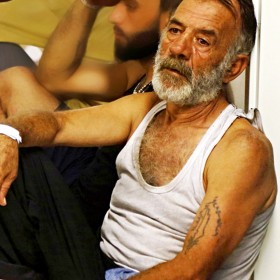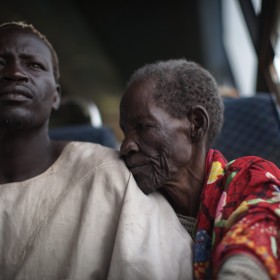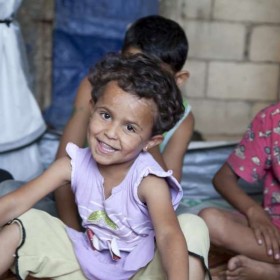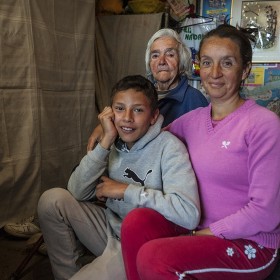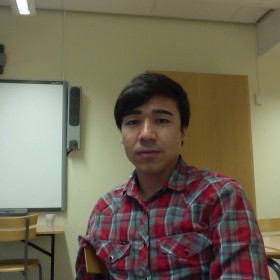A. A. Gill hears women’s stories in the Congo
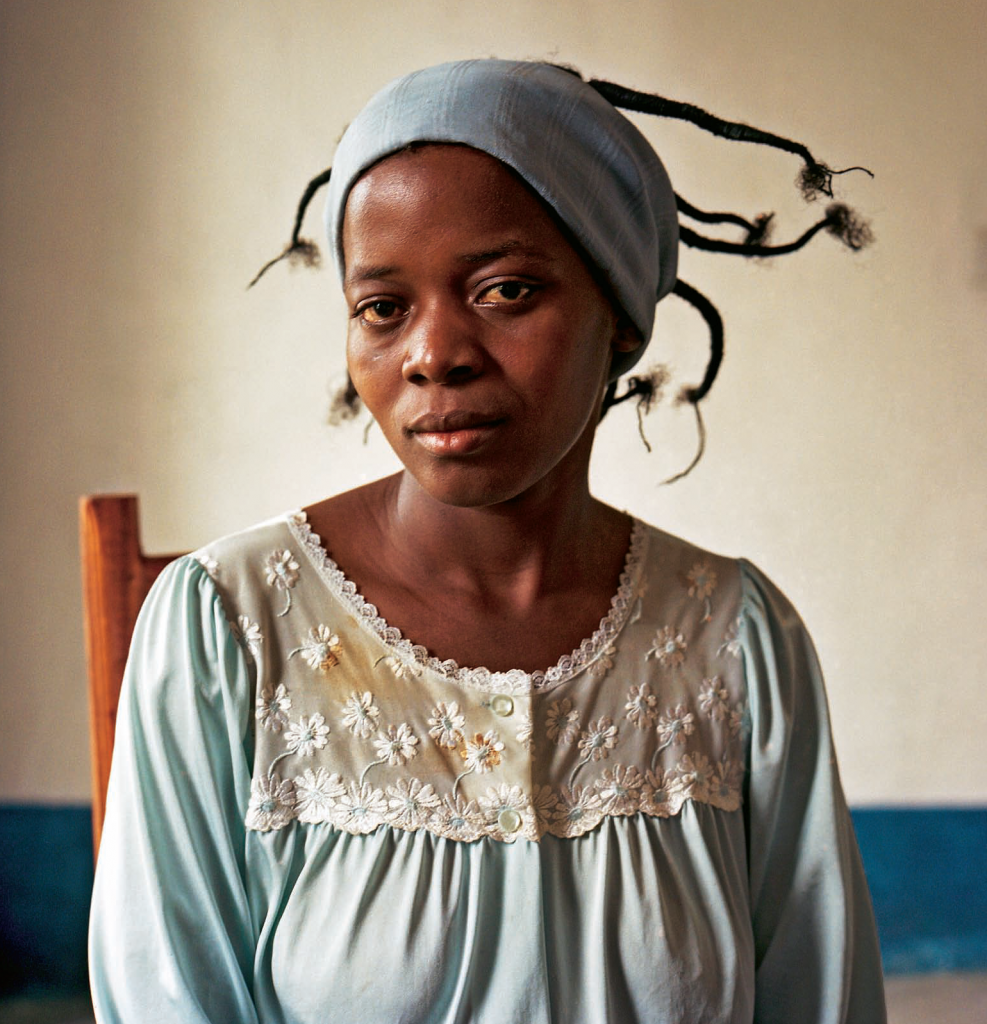 The broad, brown, bloated Dungu River slips with a clotted lethargy through the silent bush, as if it were too hot and humid to do anything more than roll over and float past the mango trees, where squadrons of bright ibis squabble over nothing. The still air begins to collate clouds for the afternoon deluge; the temperature trudges up with a practised ennui. It is the end of the rainy season. The river rolls on to meet the equally stupefied khaki Kibali, and here is the small town of Dungu. This is close to being the very heart of Africa, the dark heart of the dark, dark continent. The Democratic Republic of the Congo is the byword for everything that is irreparably, congenitally wrong with Africa. All the bleak white fears, the nose-tapping, knowing racism, the comfortable schadenfreude about the ancestor continent, are all comfortingly wrapped in the dark horror of Congo. Of all the places I’ve travelled, I have never had such dire and unanimous warnings against setting foot in a country. Six-thirty in the crepuscular morning and the Catholic church fills up for communion. Three priests in Roman finery offer the mass in the fluting local tongue. In place of an organ, there are drums. African voices hymning over their rhythm is one of the great spine-tingling, ear-pricking sounds of this continent. A fresco of the crucifixion shows a white Christ on the cross; his mother is black, a parable of Africa: the white boy rises again and leaves to take over his father’s business. The black woman is left to mourn and make the best of it. There are a lot of bereft mothers in the pews. This is officially the most dangerous country in the world to be a woman. Up here, in the northeast, there is a war being fought by such a world-winning array of militias, rebel groups, renegade deserters, carpetbaggers and mercenaries that the list reads like the combatants in some slasher computer game: the M23, the interahamwe, the Mai Mai and the Congolese army. This constantly simmering conflict is taken out on the civilian population. No military group is strong enough to hold ground for long, so they rule through projecting terror and inflicting an inflation of creative humiliation. There is a pandemic of rape, often the most diabolically and physically debilitating type, and proxy-forced rape, where captured boys are made to abuse or murder their neighbours to crush any sense of community and give them nowhere to escape. There are constant kidnappings of children to be taken as slaves and recruits and, therefore, a concomitant increase in despairing domestic violence. In communities that are traumatised and permanently terrified, the true figures can only be guessed at, but they are without parallel. This is effortfully the worst place in the world. Angélique, a middle-aged woman, says her departing prayers, crosses herself and rises, beaming. She has a smile that belies all other emotions, all anxiety and transfigures not just her face, but everyone’s it bathes. Angélique is a nun, an Augustinian. She doesn’t wear the wimple or robes of her order, but the elegant home-tailored costume of local cloth, a turban and DayGlo, acid-green, apple-logoed flip-flops. Her skirt is printed with the face of another nun, a local woman who was martyred in a previous war by the Simba for refusing to marry a colonel, who stabbed her to death for pointing out that she was already betrothed to Christ. Angélique is a singular and powerful force for good in Dungu, which has grown to be the terminus at the end of the line for hundreds of displaced people driven from their homes, not by the ruling factions of power, money and mining, but by that darker embodiment of collective psychopathy, the Lord’s Resistance Army (LRA): the oldest and most conceivably sadistic terrorist group in Africa.
The broad, brown, bloated Dungu River slips with a clotted lethargy through the silent bush, as if it were too hot and humid to do anything more than roll over and float past the mango trees, where squadrons of bright ibis squabble over nothing. The still air begins to collate clouds for the afternoon deluge; the temperature trudges up with a practised ennui. It is the end of the rainy season. The river rolls on to meet the equally stupefied khaki Kibali, and here is the small town of Dungu. This is close to being the very heart of Africa, the dark heart of the dark, dark continent. The Democratic Republic of the Congo is the byword for everything that is irreparably, congenitally wrong with Africa. All the bleak white fears, the nose-tapping, knowing racism, the comfortable schadenfreude about the ancestor continent, are all comfortingly wrapped in the dark horror of Congo. Of all the places I’ve travelled, I have never had such dire and unanimous warnings against setting foot in a country. Six-thirty in the crepuscular morning and the Catholic church fills up for communion. Three priests in Roman finery offer the mass in the fluting local tongue. In place of an organ, there are drums. African voices hymning over their rhythm is one of the great spine-tingling, ear-pricking sounds of this continent. A fresco of the crucifixion shows a white Christ on the cross; his mother is black, a parable of Africa: the white boy rises again and leaves to take over his father’s business. The black woman is left to mourn and make the best of it. There are a lot of bereft mothers in the pews. This is officially the most dangerous country in the world to be a woman. Up here, in the northeast, there is a war being fought by such a world-winning array of militias, rebel groups, renegade deserters, carpetbaggers and mercenaries that the list reads like the combatants in some slasher computer game: the M23, the interahamwe, the Mai Mai and the Congolese army. This constantly simmering conflict is taken out on the civilian population. No military group is strong enough to hold ground for long, so they rule through projecting terror and inflicting an inflation of creative humiliation. There is a pandemic of rape, often the most diabolically and physically debilitating type, and proxy-forced rape, where captured boys are made to abuse or murder their neighbours to crush any sense of community and give them nowhere to escape. There are constant kidnappings of children to be taken as slaves and recruits and, therefore, a concomitant increase in despairing domestic violence. In communities that are traumatised and permanently terrified, the true figures can only be guessed at, but they are without parallel. This is effortfully the worst place in the world. Angélique, a middle-aged woman, says her departing prayers, crosses herself and rises, beaming. She has a smile that belies all other emotions, all anxiety and transfigures not just her face, but everyone’s it bathes. Angélique is a nun, an Augustinian. She doesn’t wear the wimple or robes of her order, but the elegant home-tailored costume of local cloth, a turban and DayGlo, acid-green, apple-logoed flip-flops. Her skirt is printed with the face of another nun, a local woman who was martyred in a previous war by the Simba for refusing to marry a colonel, who stabbed her to death for pointing out that she was already betrothed to Christ. Angélique is a singular and powerful force for good in Dungu, which has grown to be the terminus at the end of the line for hundreds of displaced people driven from their homes, not by the ruling factions of power, money and mining, but by that darker embodiment of collective psychopathy, the Lord’s Resistance Army (LRA): the oldest and most conceivably sadistic terrorist group in Africa.
When I first came across them a decade ago in northern Uganda, they were known as the Rebels Without a Cause because no one who had met them had lived long enough to discover what it was they wanted. Driven out of their native Uganda, they have bled into the ungoverned badlands where Congo, South Sudan and the Central African Republic meet: these are three remedially dysfunctional nations. The LRA wages a campaign of calculated terror, not with governments or other armies, not for diamonds or gold or political gain, but specifically and systematically for survival. They loot and rape and mutilate and murder and kidnap without aim or motive, just a nihilistic imperative to keep going. The town is poor, a collection of mud huts that hide themselves in the jungle, a few modest municipal buildings, a street of colonial market shops. Beside the single-lane bridge is a derelict hydroelectric plant. There is no electricity. There was once going to be a railway to take abundant farmed produce to Sudan, now there is barely a road. This is a town, a state, a nation, that isn’t just slipping, it’s been shoved back into the dark. I’ll tell you how poor this is: it’s so poor there is no advertising, no painted signs for Coca-Cola or mobile phones; so poor there is no rubbish, no blown plastic bags that litter the rest of Africa; too poor even for beggars: no child or destitute widow or cripple ever asks me for so much as a mouthful of porridge or a Biro. This place was besieged and preyed on by the LRA until the UN set up a small, protective force, a detachment of Moroccan soldiers with their armoured Humvees and blue-bereted boredom. It was enough to offer a cordon of stability, a candle of hope, and refugees ebbed in. The UN Refugee Agency, UNHCR, responsible for the displaced, came to help them. Angélique hadn’t meant to become involved: she was a reluctant lifeguard. One day she was in a hospital, and a young woman who had just given birth told her that she knew she was going to die and that someone must look after her infant. Angélique said she would find someone, but there was no one. She saw the dying woman in the street and asked why she wasn’t in the hospital. The mother said it was because she was desperate to find someone to save her child. Angélique, who was preparing to join the refugees herself, said she would go to church and she prayed and agreed to take the baby, and the woman died. Angélique, a middle-aged nun without a family, now had a baby, and for eight months she held it and tended it and then it too died, and people started to bring her babies. She said she couldn’t do it again, not after the death of the first, but she did and she found foster parents. She would cajole family members with promises of help and milk and sugar. She got the hospital to give her medicine. Now she lives in her modest hut by the river with six toddlers who clap and gurgle when they see her and climb and hug her legs with beatific expressions like glossy putti, and Angélique’s smiles fall on them like a beneficence. Goodness has a habit of growing in the deficit of its need. Like greatness, some are born to it and achieve it, but the best, like Angélique, have it thrust upon them and reluctantly step up to it. And so, after the orphans came the teenage girls with the children of rape and forced liaisons with soldiers. Lois is a quiet child with her hair cropped. She’s lost two teeth. She was taken from the fields by the LRA when she was just 14 and given to a soldier as his second wife. She speaks of it in a quiet monotone. His other wife hated her, living in the bush was terrible, the constant marches to the Central African Republic and South Sudan, the attacks from the Ugandan army, the brutality of the guerrillas, the executions, the beatings. She bore her rapist husband two children and then, in Sudan, he was scouting for a new camp when he met the Janjaweed, a Muslim militia quite as ruthlessly terrifying as the LRA. They killed him. Lois says she was sad when he died because, she says: “I would eat sadness.” There was no one to protect her or her infants. The LRA threw her out and she walked through the bush with two tiny children, not much more than a child herself. She doesn’t know if her family are alive. She lives in a little camp of refugee women that Angélique has set up. The children play in the hot earth, she constantly watches them, and though she would be accepted back into town life, it won’t be so easy for them. I ask what she felt about this man who was their father. She looks up with an expression that is too deep to read and says with a pure, stern finality: “They are my children and the children of a wild animal from the bush.”
Angélique has formed the women into a collective. They fry doughnuts to sell in the morning, cook catfish lunches for the NGOs, she has charmed and begged and demanded sewing machines so they can start a business, she’s opened a school so these young women can take back some of the rudimentary education that was stolen from them along with everything else. They have been given some land to grow food on. Angélique has bought some soya and they plant maize and manioc, pondu — a spinach-like leaf — and peanuts, as a basic protein. The fields around Dungu blend into the jungle with their plantain and palms and mango trees, full of birds and butterflies. They look like Victorian paintings of a savage Eden. This is a miraculously fertile country: they get three harvests a year without fertiliser by rotating crops; no one starves. Children suck on maize cobs contentedly, and why Congo isn’t feeding Africa, feeding Europe, isn’t so much a mystery as a terrible, sinful shame. But these fields are also the places of most danger. This is where the LRA came to steal women and boys and kill their men. Here is Pascaline, whose two boys were taken from the fields two years ago. One was killed for being too weak and too young, the other has, against all prayers and odds and hope, returned. He surrendered to the Congolese army, but has been shot and lost a hand. Pascaline is racked with conflicting emotions: ecstatic to have him home, desperately sad for his loss. “He is 18,” she says. “I have to dress him. It’s not right to be crippled.” Here, where all life is physical and dexterous, it is a sentence to charity and uselessness. She says he has changed — he’s dark, it’s difficult. But these girls, these women, are not broken reeds. They don’t behave like victims, they work together with mutually gleaned strength and energy; they laugh and there is not just a single person bent over a job, there is always company, there is always another hand. The children are looked after by each other and by all. There is one young woman who is obviously severely subnormal. She lives with her sister’s family and sits on a small stool while the village works, grinning and counting her fingers, but every other girl takes a moment from their work to wink or to wave, to joke and include her. They fold into each other, like the dough they knead, all rising together. The collective resilience and power of women in this continent is a constant source of speechless admiration. The UN keeps track of LRA attacks on a map, collated by a friendly and excitable Indian tracker. The red pins cluster in what they call, with a bureaucratic understatement, the Triangle of Death. The village of Ngilima is at the apex of this triangle. Its population has already decamped to Dungu and filled again with ever-more desperate refugees from more remote communities in the bush. The UN says the hour-long drive is too dangerous without an escort, so the Moroccans have agreed to accompany me with an armoured car, but I’m woken in the morning to be told there had been a little hiccup. The Moroccans say they can’t come after all because it’s Ramadan — but never mind, a contingent of Congolese police have agreed to ride shotgun. They are a fabulous force of desperados straight from some Hollywood central casting: dark glasses, berets and bits of uniform, Kalashnikovs and ancient Belgian FN rifles. They all carry looks of obsidian menace and malevolence. We’re not entirely sure that they’ve got actual bullets and I rather hope that they don’t, because they keep pointing their guns through our windscreen. You can get a phone signal almost everywhere in Congo, you just can’t physically get anywhere. The lack of access makes everything else — government, security, health, news, trade — virtually impossible, so the UN is building roads, which will do more for the country than a squadron of Hercules full of fact-finders and politicians’ conferences. Already a little business is being driven in from Uganda on a new safe route and here, on the red earth road, we pass occasional diggers and crews of navvies protected by Nepalese soldiers opening up the interior. But we leave them behind, and the road that began broad gently narrows until the jungle crowds in, tapping the windows, dousing the light. We drive along a cratered, waterlogged path that looks like tikka masala. The police hunch their shoulders and stare manically into the wall of green, the engines howl and wheels spin, the tension ratchets up, the turned LRA boy soldiers say they watch the trucks from the side of the road. Finally we run into a clearing that is the little village of Ngilima: a row of shops, churches, a smatter of mud huts. I’m taken to talk to Jean. She bends through the low door shyly, sidling into the room that smells of smoke and damp. She’s nervous, weary, she’s barefoot in a faded dress, with a headscarf and eyes that reflect a terrible, resigned pain. The bottom half of her face is a coarse lump of wrapped tissue, as if sculpted by a child, with a cloacal hole poked in it. It is the primeval disfigurement of rage. She sits and talks quietly, her mouth opening and closing like a sea creature out of water. She was in the fields with her husband, the LRA came out of the bush and beat him to death in front of her; she knelt on the ground cradling him and they came for her with a machete. But the officer said no, not the machete, not the gun. “He asked, did I want to live or die? I was crying, holding my husband. ‘Kill me,’ I said. He was angry and said, ‘You’re mocking us,’ so they took a razor and cut off my mouth.” She draws her finger around the lump of scar. “It fell in my lap like a doughnut.” What? “It fell in my lap like a doughnut. I went to pick it up. They cut my mouth then each side, cheek to ear. ‘Go and tell the soldiers,’ they said. ‘Tell them to come and get your husband.’”

Jean, 55. After her husband was beaten to death, she was sent back to the village as a warning to others.
“My mouth fell into my lap like a doughnut”
Nobody knows how many LRA soldiers there are: they split and they split and they split into smaller and smaller groups. They have 25 years’ practice in inflicting the most atrocious and fearful horror. Terror is a force multiplier: it moves thousands; it paralyses a land the size of Britain. Nothing that the sated imagination of Hollywood or what the trolls on the internet have constructed is as powerful or prehistorically, shriekingly effective as the living nightmares that stalk the hotdarkness of Congo. The women come and tell me their stories one after the other. I don’t interview them, I just ask them to talk as they see fit, and they speak with a disconnected matter-of-factness as if to distance themselves from the words; they look away from the images they conjure of themselves. Amenisia: her brothers were killed, she escaped into the bush with five children, one died. Marie is 34; her husband, father and uncle were killed in the fields. She is now the second wife of a man who doesn’t support her; she misses her father. “If I say more, I will cry.” She stops. Her 14-year-old daughter is pregnant. Clementine: Clementine lost her mother and father, fled with six siblings and her four children. Another Marie had a disabled sister and a blind brother; both were murdered. Her husband abandoned her with four children. Florentine doesn’t know her age but she was born within the time of the Simba. Her brother was killed on his bicycle; he left nine children, which she looks after; her own marriage is unhappy and barren. Laura is 25; her family name translates as “I had to go through a lot”. Her fields were burnt, her neighbours slaughtered, she ran with her small children to hide in the jungle, her sister and brother were killed. The Congolese army tried to stop her running away but she persisted, pushing through the road blocks with her children and an orphan she collected on the way. Vivien, whose surname means “What’s new”, has 10 children. Her daughter was kidnapped and is gone, lost; her husband got sick and has died. Now she has 11 children. Another Marie: she escaped from an LRA camp where she had been repeatedly raped. I walked out of the hut, just for a moment, just to collect myself, because I don’t trust my emotions or my face. It isn’t the pity that gets you, it’s the intense dignity of vulnerable bravery. I come across a family of pygmies, they shake my hand and I suppose them to all be Yoda-ishly wise. Someone points at an ill-made, collapsing hut. I duck inside and there on the floor, a man is dying. He smells faintly of piss, he’s wasted away to faded skin rung over a rack of bone; his hands, with their long yellow nails, are crossed on his chest. He opens his malarial eyes and smiles, revealing his last tooth. A niece sits in the shadows to see him on his way. She asks if I could spare a little sugar. It is a surprisingly calm and comforting human meeting. In the square in the heart of Ngilima, the displaced and the bereaved and the lost have all collected together to build a marketplace. Hundreds of people carrying baskets of red earth: they dig trenches, cut posts, carry water for workers; a man with a bullhorn directs the crowd, who sing and clap. This endeavour is an act of immense optimism, like the climax of a Russian realist film: build it and they will come, the market will come, the fear will be banished. I go to see Pascaline’s son, who returned from the LRA but lost his hand. He has 11 brothers and sisters; he is the most traumatised of all the victims I see. He has bouts of terrible rage and then periods of silent depression. He sits and talks in whispers and three-word sentences: he was taken with his brother to be porters and given impossibly heavy burdens to carry through the forest. There were hundreds of boys used as slaves. The youngest and weakest were taken away and killed with machetes and sticks. His younger brother complained and was slaughtered. After two years, Felicite was the only one of the boys who’d started who was still alive. Then, one day, they were ambushed by the Congolese army and he surrendered and shouted he’d been kidnapped and was shot in his raised hand — he doesn’t know by who. I ask what is the worst thing he’s done and he pauses for a long time and his family watch him miserably. “The looting,” he says quietly. There is no joy in the returned son, there is just a different fear and worry. Later I’m told that without his family there, Felicite has said that the LRA made him kill and rape, and there is the wordless worm of suspicion that this lost boy may have been forced to murder his own brother. The night before I have to start the long journey back to London, Angélique comes to say goodbye. Hard times in bad places are invariably where you find good people and, over the years of travelling, I have met a bright few, but I can’t remember anyone as inspiring as Angélique, an embodiment of Agape, the charitable love of humanity: an exceptional woman, called to a place of exceptional torment. This nun has now been awarded the Nansen humanitarian medal by the UN. Congo is the terror that hides in the jungle at the edge of our world; Congo is the name of the bogeyman, the apocalyptic dark heart of the black continent that has fascinated Europe with its distant horror for centuries. But let me tell you, it is also one of the most moving and beautiful and uplifting places I have been to. Not despite its torments, or our shuddering fascination, but because of them. Angélique gives me a doll that the sewing collective have made for my daughter. She says they thank me for coming all this way to hear their stories. Of course, it’s not really me they thank, it’s you for listening. She smiles and holds up the rather gimpy thing. “We don’t make dolls for children,” she says. “But maybe we should start.” Written by A. A Gill Portraits by Rena Effendi Originally published in the Sunday Times.






